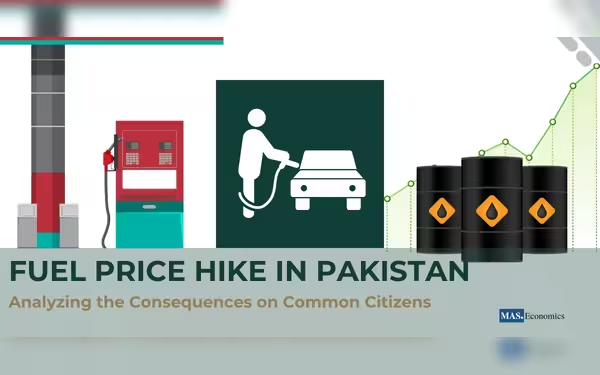Thursday, July 4, 2024 06:12 PM
Consumers in Pakistan to Face Fuel Price Hike
- Petrol and HSD prices set to increase by Rs7 and Rs8 per litre.
- International market surge driving domestic fuel costs up.
- Government's tax decisions impacting general public's daily lives.
 Image Credits: maseconomics
Image Credits: maseconomicsConsumers in Pakistan are bracing for a rise in petrol and HSD prices due to international market fluctuations and government tax decisions, impacting daily lives and economic landscape.
Starting from July 1, consumers in Pakistan are likely to face an increase in the prices of petrol and high-speed diesel (HSD). The expected rise is Rs7 per litre for petrol and Rs8 per litre for HSD. This surge is primarily attributed to the recent uptick in international market prices, where petrol and HSD prices have surged by approximately $4.4 and $5.5 per barrel, respectively, over the last fortnight.
The final price adjustments will also consider the existing tax rates. Petrol is expected to see a Rs7 hike, while HSD may increase by Rs8.5 per litre. If the government decides to raise the petroleum development levy (PDL) from the current Rs60 per litre to the maximum limit of Rs80 per litre, the price hike could be even steeper.
Since May 1, both petrol and HSD prices have been on a downward trend due to the slump in the international market. Petrol prices have decreased by around Rs35 per litre, while HSD prices have dropped by about Rs22 per litre. However, the government has already reached the maximum PDL limit of Rs60 per litre on both products.
Despite the zero general sales tax (GST) on petroleum products, the government imposes a Rs60 per litre PDL on petrol and HSD, along with additional customs duties. These price adjustments directly impact the general public, especially the middle and lower-middle classes who heavily rely on petrol for their daily transportation needs.
Petrol and HSD prices play a significant role in driving inflation, as they are widely used in various sectors such as private transport, agriculture, and heavy transport vehicles. The increase in fuel prices also contributes to the overall rise in the cost of living, affecting the prices of essential commodities like vegetables. With monthly sales of 700,000-800,000 tonnes, petrol and HSD remain crucial revenue sources for the government.
The anticipated rise in petrol and HSD prices from July 1 underscores the impact of international market fluctuations on domestic fuel costs. As consumers brace for higher prices at the pump, it is essential for policymakers to strike a balance between revenue generation and ensuring affordability for the general public. The government's decisions regarding tax rates and levies on petroleum products will continue to shape the economic landscape and influence the daily lives of citizens across the country.













